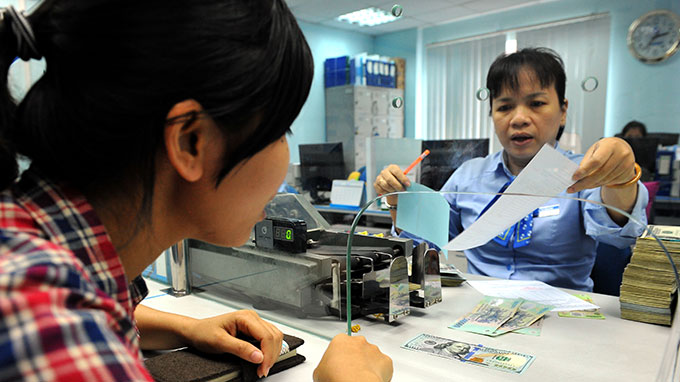Hoarding the U.S. dollar will not be a popular trend as depositing Vietnamese dong in banks is now more profitable, said a senior state official from the national financial market watchdog.
On Wednesday evening, the State Bank of Vietnam (SBV) announced a decision to devalue the dong by one percent starting Thursday.
If the SBV which is the central bank depreciates the dong by one more percent against the greenback from now to the end of this year, the dong will lose only two percent of its value against the U.S. dollar in 2014, said Truong Van Phuoc, deputy chairman of the National Financial Supervisory Commission.
The current depositing rates at local banks are quoted at around 5-7 percent per year for short-term deposits and 7-9 percent per year for long-term ones.
"In essence, the exchange rate between the dong and the greenback is largely influenced by inflation,” Phuoc said.
“Meanwhile, in recent years, inflation has been curbed in Vietnam and the differences in inflation rates compared to the values of many main foreign currencies have reduced.”
As a result, the adjustment by a few percent in exchange rates is not a big problem for Vietnam," he added.
Regarding the question that if the recent devaluation is an active move of the central bank, Phuoc said it is very proactive, as the SBV governor has previously mentioned the devaluation when necessary.
When asked why the SBV is devaluing the dong while having expanded its national foreign exchange reserves, which means there will be no shortage in supply of the foreign currency, Phuoc said the devaluation should be observed in the macroeconomic context of Vietnam.
“When speaking of the devaluation of a currency, people look at the inflation index. This year, the inflation is forecast to be lower than 5 percent, which means the dong will be devalued at that rate, but it is still much lower than in previous years as inflation rates were always in the double digits.”
The central bank’s act of buying more foreign currency for the national foreign exchange reserves, besides helping expand the reserves, also increases the supply of Vietnam dong to the local market, the deputy chairman said.
“The SBV's monetary policy is to regulate the amount of money issued to purchase foreign currency without affecting inflation. Given all of the facts, the dong has been put under pressure of depreciation lately," he added.
Regarding the question why depositing in dong is still more profitable than converting to the greenback, Phuoc said that as the dong will not devalue over two percent in 2014, the current dong deposit interest rate at 5-7 percent per year will be more profitable.
“But the decision of what currencies to hold in is a personal choice and it will depend on the investment decision of each individual,” he added.
When asked if the rates quoted at banks and in the black market will be stable after the devaluation, Phuoc said he hopes so.
“With my experience, I can only predict after all the expectation for a devaluation in the last six months, the central bank’s move has satisfied the expectations of the market,” the official remarked.
“In addition, the central bank has raised interest rates for treasury bills, so buying the bills issued by the central bank will have a higher benefit than buying foreign currency.”
Regarding whether the devaluation will benefit Vietnamese exporters while the country has to spend a big sum on importing machinery and raw materials for production every year, Phuoc said it is the job of the central bank to plan and make moves carefully.
“With an export-led economy like Vietnam, the central bank will have to consider finding a balance between the loss caused by exchange rate adjustments and the gains from exporting," he said.
“Raising the rate will help exporters benefit more, and for that reason, they can lower the export prices while ensuring profits and increasing competitiveness on the international market.
“However, as Vietnam is a big importer and debtor, keeping the exchange rate stable is an important requirement to limit the impact on import prices. The remaining problem is the supply and demand of the market, because the market is ultimately the best reflector of the permeability of the exchange rate on the prices of imported and exported items.”
Like us on Facebook or follow us on Twitter to get the latest news about Vietnam!




















































